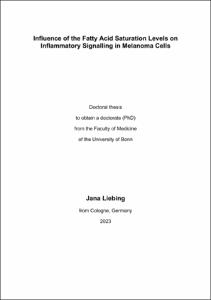Influence of the Fatty Acid Saturation Levels on Inflammatory Signalling in Melanoma Cells
Influence of the Fatty Acid Saturation Levels on Inflammatory Signalling in Melanoma Cells
| dc.contributor.advisor | Hölzel, Michael | |
| dc.contributor.author | Liebing, Jana | |
| dc.date.accessioned | 2023-09-11T09:53:07Z | |
| dc.date.issued | 11.09.2023 | |
| dc.identifier.uri | https://hdl.handle.net/20.500.11811/11030 | |
| dc.description.abstract | Due to their rapid proliferation, tumour cells have an enhanced demand for lipids. Therefore, increased lipogenesis is considered as a hallmark of cancer. In melanoma, the lineage addiction oncogene MITF regulates the lipogenic enzyme stearoyl-CoA desaturase which converts saturated fatty acids into monounsaturated fatty acids. The MITF-SCD axis regulates melanoma phenotypic plasticity and suppresses stress and inflammatory signalling. The exact mechanism how SCD activity and inflammatory signalling are associated is not understood yet.
In order to understand the molecular mechanism, we analysed the effect of an imbalance of the saturation of fatty acids by treatment with specific SCD1 inhibitors or saturated fatty acids on human and murine MITF-dependent melanoma cell lines. Inhibition of SCD1 reduced melanoma cell proliferation and induced the expression of pro-inflammatory cytokines. By performing a candidate knockout screen of innate immune targets, we found a connection between the cytosolic DNA-sensing cGAS-STING pathway and inflammatory signalling upon SCD inhibition. Absence of cGAS and STING led to a reduced expression of inflammatory cytokines. Generally, active cGAS-STING signalling mediates the activation of the kinase TBK1. Interestingly, under imbalanced fatty acid saturation, TBK1 was activated independently of cGAS and STING and eventually led to the activation of NF-kB in melanoma cells. Another interesting finding was that activation of the STING pathway with a specific agonist was restricted under increased fatty acid saturation levels. This has probable implications for cancer treatment strategies relying on STING signalling for melanoma patients with lipid disorders. In summary, the findings of this work show an unexpected activation of TBK1 upon an imbalance of fatty acid saturation in melanoma. The kinase is a crucial activator of NF kB and inflammatory signalling. Hence, we found a key role for TBK1 at the crossroads of lipid metabolism and inflammation in melanoma. | en |
| dc.language.iso | eng | |
| dc.rights | In Copyright | |
| dc.rights.uri | http://rightsstatements.org/vocab/InC/1.0/ | |
| dc.subject.ddc | 570 Biowissenschaften, Biologie | |
| dc.subject.ddc | 610 Medizin, Gesundheit | |
| dc.title | Influence of the Fatty Acid Saturation Levels on Inflammatory Signalling in Melanoma Cells | |
| dc.type | Dissertation oder Habilitation | |
| dc.publisher.name | Universitäts- und Landesbibliothek Bonn | |
| dc.publisher.location | Bonn | |
| dc.rights.accessRights | embargoedAccess | |
| dc.date.embargoEndDate | 15.09.2025 | |
| dc.identifier.urn | https://nbn-resolving.org/urn:nbn:de:hbz:5-72203 | |
| ulbbn.pubtype | Erstveröffentlichung | |
| ulbbnediss.affiliation.name | Rheinische Friedrich-Wilhelms-Universität Bonn | |
| ulbbnediss.affiliation.location | Bonn | |
| ulbbnediss.thesis.level | Dissertation | |
| ulbbnediss.dissID | 7220 | |
| ulbbnediss.date.accepted | 23.08.2023 | |
| ulbbnediss.institute | Medizinische Fakultät / Institute : Institut für Experimentelle Onkologie | |
| ulbbnediss.fakultaet | Medizinische Fakultät | |
| dc.contributor.coReferee | Tüting, Thomas |
Dateien zu dieser Ressource

Dieses Dokument ist zur Zeit gesperrt.
Das Dokument erscheint in:
-
E-Dissertationen (1600)



